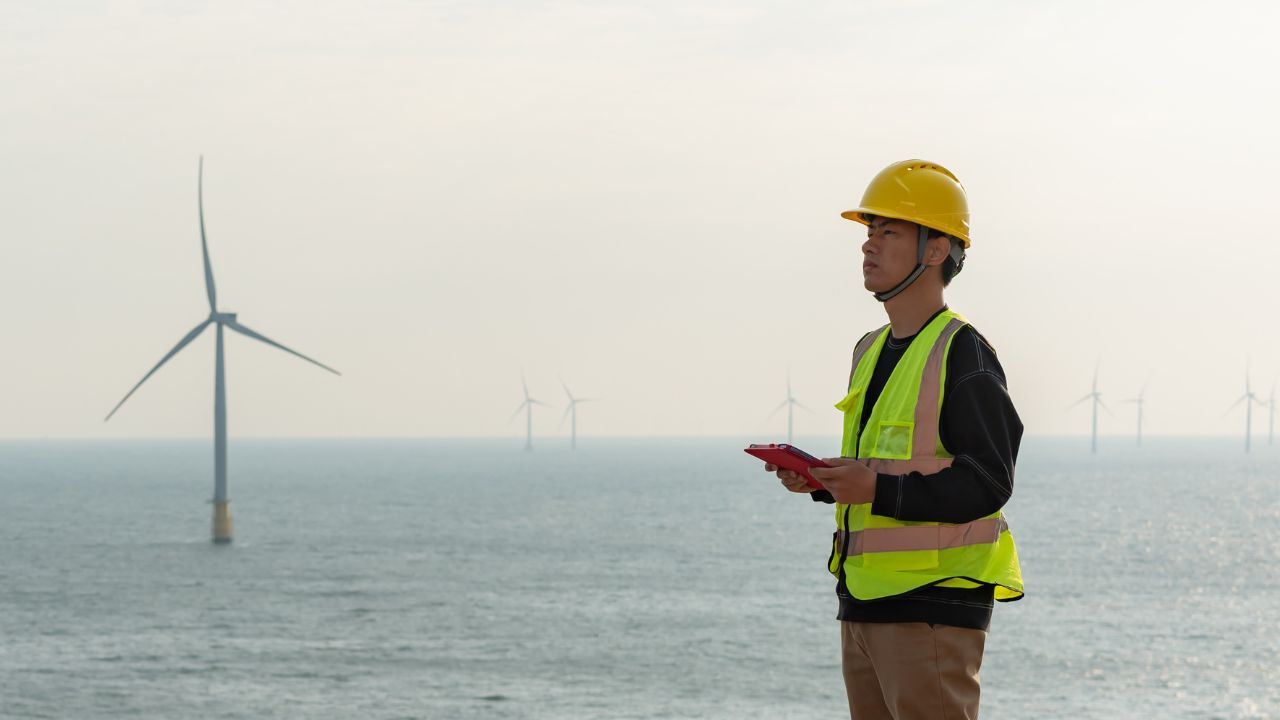How can businesses overcome talent challenges in Renewable Energy?
20 Mar, 202414:16Sourcing, hiring, and retaining top engineering talent is critical for the success of renewa...

Sourcing, hiring, and retaining top engineering talent is critical for the success of renewable energy projects. However, the renewable energy industry is facing a skills shortage challenge.
According to the IEA, around 510GW of renewable energy was added to the energy mix globally in 2023, an increase of 50%. This growth is set to accelerate over the next five years to 7300GW, primarily driven by new global solar and wind projects. This surge in growth means knowledgeable engineers with the right skills in modern renewable energy technologies are in high demand.
On top of this, the job of a typical renewable energy engineer has also become more complex in recent years. While skills and understanding of the technical aspects of the role are still fundamental, it is also just as important to have a high level of computer literacy, data analytics skills and strong regulatory knowledge, with regular refresher training.
Finding and attracting top talent, as well as retaining staff, is a constant concern for businesses. Companies must find and place the talent, work legally and compliantly on remote sites, and ensure they have all the support they need to succeed.
In this blog, we look at three of the biggest challenges of finding and placing a renewable energy workforce at these locations and how businesses can overcome these challenges.
What recruitment challenges are renewable energy companies facing?
Renewable energy companies looking to expand their teams are facing three significant challenges;
- A lack of knowledge of the opportunities within the industry from candidates
- Attracting talent with training and incentives and a clear progression ladder
- Retaining talent with competitive salaries compared to blue and white-collar roles in other sectors.
One of the first major hurdles is local and regional brand awareness. It's far more difficult to attract high-quality talent if a company is trying to reach candidates who haven't heard of them or aren't aware of their work in renewables. Renewable energy companies often compete with other industries with similar skills and needs, particularly electricians and engineering, so it's important not to underestimate the power of solid marketing and branding to ensure new and existing candidates know the considerable opportunities in the future of energy.
Secondly, even once companies have made potential candidates aware of the renewable industry opportunities, these companies are still competing against the training and progression available elsewhere. Entry-level roles in the industry require similar skills to those of other sectors, but the technology behind solar and wind is advancing quickly, and specialised skills are in high demand to keep up with growth. To retain talent, candidates must be confident they can gain these skills, evolve with the industry, and advance from entry-level to senior positions, even when working remotely or moving around different sites and projects.
Finally, while other essential factors to today's workforce include flexibility, opportunities for development and robust training strategies, salaries and benefits are still significant. As mentioned, the entry-level skills for engineers and technicians apply to a broad range of industries, even traditional energy companies. Companies need to ensure the salaries for these positions are competitive relative to other industries. For example, salaries for management and specialised skills are higher in the US than in Europe. Still, even here, the salary ranges can differ and, in some cases, are less appealing than equivalent roles in oil and gas.
With a combination of market awareness, high demand for skills in scarcity, and ensuring opportunities for growth and development, what can companies do to attract and retain talent from the right areas?
The key is global mobility –finding and attracting the right talent locally while leveraging global presence to place expertise where needed most.
Workforce Mobility: Retaining Top Talent
Workforce mobility is essential when considering that most renewable energy projects are in remote locations, which means companies need to be able to support workers in travelling to projects, providing accommodation, and ensuring high-quality communication channels. Companies that successfully attract top talent know this and implement processes and strategies that allow them to recruit highly skilled people and deploy them globally on projects as needed.
This is particularly important when hiring highly qualified expats. The renewables industry is emerging and growing rapidly, and the number of experts in this field, while growing, is still small. Companies must be able to move their expatriate teams from project to project, to maximise their effectiveness across the whole company portfolio.
Another advantage of this strategy is reduced costs. Renewable companies can use global workforce mobility to move more experienced teams to new sites, ensuring a project runs smoothly from the beginning while also training the workforce below them. In this way, a global company can assign resources to the projects where needed rather than needing to hire a new team in the region for every new or expanding project. Top talent is retained as they are offered the opportunity to travel, learn new skills, and advance through the supervision and training of teams. Newer workers are more likely to stay when they have a clear career progression, which offers the same opportunities as they develop their skills and experience.
Workplace mobility also enhances collaboration and knowledge sharing. Good communication tools allow teams to connect and share information, regardless of their physical location, such as Team and Zoom, as well as regular written and video communication through news boards, company newsletters, and recorded video information. Teams feel connected, up to date on project developments, and able to raise issues and concerns promptly. Companies that excel in this area often combine travel for their senior and supervisory teams to ensure regular face-to-face contact with the broader organisation and maintain regular contact through online connections.
The key to ensuring good communication is around site infrastructure. Companies operating sites should ensure that their teams can access phone lines and the internet, which often means satellite internet and communications in remote areas, particularly offshore. This connection is also critical to sending and receiving site data, so as mobile and broadband technology has advanced, the quality of available connections has also improved.
As work-life balance becomes more prevalent in the energy industry, providing good transport and accommodation is also key to retention. As work-life balance has become more prevalent, companies that offer more flexibility in shift work, travel, and downtime see increased staff retention, which means lower costs.
Talent access: Finding the right skills locally
As discussed, teams of expatriate contractors operating many local projects, and moving from project to project across the globe, has become essential to keep renewable energy targets on track. In some countries, however, this has been perceived as taking jobs away from a local workforce, and many countries at the forefront of the renewable energy industry are taking action.
Many countries now have nationalisation targets within their labour force, which means a percentage of the workforce must come from the local talent pool. The problem for site operators emerges when the local workforce lacks the skills and experience for in-demand roles, such as high-level technical or engineering positions.
Thankfully, local governments also acknowledge this need for specialist skills to ensure projects move forward, and there are often exemptions for hiring expatriate talent for these roles. So, while a company may have difficulty bringing in contractors for administrative or labour work, engineering supervisors or specialist equipment operators are more likely to be granted working permits and visas.
While this solves some of the problems in the short term, Governments also often require companies to train local workers to replace their expatriate contractors in the long term to boost local employment and permanently increase local skills. As a result, the reliance on foreign contractors will decrease over time, and companies are encouraged to hire and train more nationals.
There are additional benefits to offering training locally. Training and development plans improve retention by giving employees a clear career plan and goals. Regular training also ensures workers remain compliant with regulations and best practices, a critically important part of health and safety law in the renewables industry.
It's also essential to consider that expatriate and foreign contractors are a temporary workforce that requires regular updates to permits and working visas; permanent residents are much less complicated to hire and retain.
How to find local talent
When a renewable energy company is looking to expand its workforce in a region, employing a third-party recruiter with a local presence and experience is often more cost-effective and efficient. The best recruitment partners will have a working understanding of hiring practices in their country and a database of suitable candidates for their recruitment area of expertise.
For renewables projects requiring specialist skills, the recruiter may already have contacts in the country who have worked on similar projects or even contractors who have previously worked on the same project. These pre-existing relationships can significantly decrease the time between a candidate search and a final placement.
Local Employment Regulations: How an Employer of Record can be the best way forward
In this blog, we've looked at the challenges of finding local talent, as well as the challenges of mobilising a global workforce. When deploying talent globally, another consideration is employment law and foreign worker rules.
Many countries with active and upcoming renewable energy projects have stringent rules and regulations on how companies can hire and deploy expatriate and foreign workers. This is often necessary in countries where the skillset needed for renewables is very small and highly competitive.
The cost of failing to follow the rules can result in significant fines and even expulsion in some countries, so businesses must understand how to hire and deploy their teams legally and compliantly.
For example, some countries in the Middle East investing heavily in renewable energy, including Saudi Arabia, the UAE, and Oman, have particular regulations on the ratio of local to expatriate workers, which also vary depending on role. There are also visa, working permit, tax, and general employment regulations to consider, which can vary within countries.
There are two solutions. The first option is to deploy a physical presence in the country of operation, with a local office and staff. The company would then need to hire according to the local rules of the host country. The company would need to ensure they are meeting nationalisation targets by hiring and maintaining all necessary permits for their foreign workforce during the length of the project. The parent company maintains complete control and responsibility for its subsidiaries in this way, but this can be costly and prohibitive to manage for short or medium-term contracts.
The second option is to use an Employer of Record or EOR. An EOR is a company based in the host country that effectively takes responsibility for workforce management on behalf of its clients. The EOR will typically manage visa applications, work permits, payroll, and taxes and ensure that the client's operation is legally compliant in that country. For most contracts in the renewable industry, this model can also be more cost-effective, as the EOR will be fully knowledgeable in employment law for the operating country, reducing the time to hire and deploy, as well as being able to support travel and accommodation support for expatriate workers.
How NES Fircroft can help
Finding the right talent, placing them compliantly, supporting them during their contract, and managing them remotely is a primary consideration for renewable energy companies seeking to remain competitive on significant projects. Many considerations can have financial and staffing implications if not correctly managed. When scaling a business for a new region, the costs can quickly mount when considering HR staff, infrastructure, accountancy, and legal teams.
One solution is to seek a recruitment partner to find the right skills and experience, a contract staffing partner for the day-to-day management of remote teams, and an EOR for maintaining the legal compliance of a local and foreign workforce on-site but dealing with multiple agencies to manage different elements of your project can become costly and complex.
NES Fircroft, as a leading provider of staffing, MSP and EOR services, provides all three solutions in one.
We support large-scale renewable energy projects through their entire lifecycle, with offices in over 80 countries worldwide and decades of experience in international expansion. From sourcing and recruitment to contract management, payroll, and EOR services, we are experts in supporting renewable energy projects globally.
Our local teams have deep knowledge of the local workforce market, sourcing local candidates with available skills and placing them quickly.
NES Fircroft provides complete EOR services, including staffing, recruitment, visa and work permit management, payroll, travel, and contractor support. We achieve this through having a local presence in the countries in which we operate, being fully compliant with local employment law, and being able to manage your workforce on your behalf.











